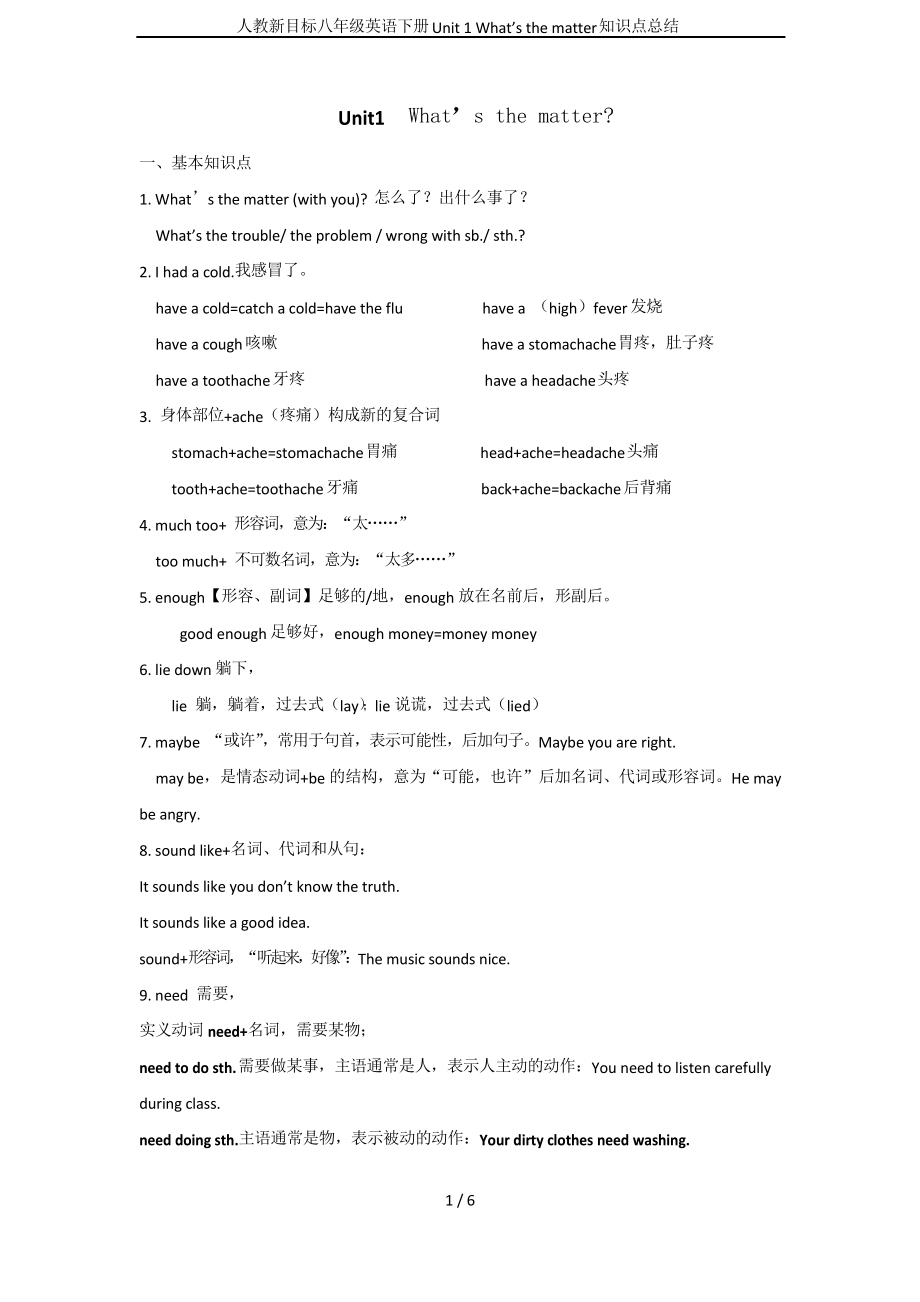《人教新目標(biāo)八年級(jí)英語(yǔ)下冊(cè)Unit 1 What’s the matter知識(shí)點(diǎn)總結(jié)》由會(huì)員分享�,可在線閱讀�,更多相關(guān)《人教新目標(biāo)八年級(jí)英語(yǔ)下冊(cè)Unit 1 What’s the matter知識(shí)點(diǎn)總結(jié)(6頁(yè)珍藏版)》請(qǐng)?jiān)谘b配圖網(wǎng)上搜索。
1、人教新目標(biāo)八年級(jí)英語(yǔ)下冊(cè)Unit1Whatsthematter知識(shí)點(diǎn)總結(jié)Unit1Whatsthematter?一�����、基本知識(shí)點(diǎn)1.Whatsthematter(withyou)?怎么了�?出什么事了?Whatsthetrouble/theproblem/wrongwithsb./sth.?2.Ihadacold.我感冒了��。haveacold=catchacold=havethefluhavea(high)fever發(fā)燒haveacough咳嗽haveastomachache胃疼���,肚子疼haveatoothache牙疼haveaheadache頭疼3.身體部位+ache(疼痛)構(gòu)成新的復(fù)合詞sto
2���、mach+ache=stomachache胃痛head+ache=headache頭痛tooth+ache=toothache牙痛back+ache=backache后背痛4.muchtoo+形容詞,意為:“太”toomuch+不可數(shù)名詞���,意為:“太多”5.enough【形容��、副詞】足夠的/地�,enough放在名前后�����,形副后�����。goodenough足夠好�����,enoughmoney=moneymoney6.liedown躺下����,lie躺,躺著���,過(guò)去式(lay)��;lie說(shuō)謊�����,過(guò)去式(lied)7.maybe“或許”����,常用于句首�����,表示可能性����,后加句子��。Maybeyouareright.maybe���,是情態(tài)動(dòng)
3�、詞+be的結(jié)構(gòu),意為“可能����,也許”后加名詞、代詞或形容詞�。Hemaybeangry.8.soundlike+名詞、代詞和從句:Itsoundslikeyoudontknowthetruth.Itsoundslikeagoodidea.sound+形容詞���,“聽(tīng)起來(lái)�,好像”:Themusicsoundsnice.9.need需要�����,實(shí)義動(dòng)詞need+名詞����,需要某物�;needtodosth.需要做某事��,主語(yǔ)通常是人���,表示人主動(dòng)的動(dòng)作:Youneedtolistencarefullyduringclass.needdoingsth.主語(yǔ)通常是物,表示被動(dòng)的動(dòng)作:Yourdirtyclothesneedw
4�、ashing.1/6知識(shí)人教新目標(biāo)八年級(jí)英語(yǔ)下冊(cè)Unit1Whatsthematter點(diǎn)總結(jié)10.getoff(thebus)下(公交車)geton上車11.agree同意,贊同��;Agreetodosth.同意做某事��,Agreewithsb.同意某人的看法�����、觀點(diǎn)Agreeonsth.在某方面達(dá)成一致�����。12.trouble問(wèn)題�,麻煩;(不可數(shù))beintrouble陷入麻煩maketrouble制造麻煩havetrouble(in)doingsth.=havedifficulties(in)doingsth.13.rightaway=rightnow=atonce�����,意為“立刻,馬上”�。14.【復(fù)
5、習(xí)】advice不可數(shù)名詞勸告�,建議,向征求意見(jiàn)askforonesadviceapieceof(good/sound/proper/bad/improper)advice一條(好的/合理的/正確的/壞的/不合理的)建議give/offersb.adviceonsth.就某事給某人建議�;takeonesadvice.接受����、采納某人的建議advise動(dòng)詞advisesb.todosth.advisesb.doingsth15.【復(fù)習(xí)】exercise動(dòng)詞意為“鍛煉、訓(xùn)練”�����,可數(shù)時(shí)意為“演習(xí)�����、練習(xí)�����、訓(xùn)練”�����,不可數(shù)時(shí)意為“鍛煉”���。16.hurt及物動(dòng)詞����,使疼痛,受傷�����,Hehurthislegwhil
6����、eexercising.不及物動(dòng)詞,(部位)疼����。Hisleghurtbadly.17.clean【動(dòng)詞】打掃�����,清理cleantheclassroom,【形容詞】清潔的、干凈的���、清白的�,acleanandtidyroom.cleaner意為清潔工�����、清潔劑�����。18.hit(用手或器具)打�����;擊打Theboyhitthedogwithastone.(hitsb.onthehead/nose/back打某人的頭�����、鼻子、后背�����,on用在所打較硬的部位)����;hitsb.intheface/eye/stomach打某人的臉�����、眼睛���、肚子�,(in用在所打較軟的部位)��。(19.beusedtosth./doingsth.
7����、“習(xí)慣于、適應(yīng)于做某事”�,強(qiáng)調(diào)狀態(tài))����。Hisgrandpawasusedto2/6人教新目標(biāo)八年級(jí)英語(yǔ)下冊(cè)Unit1Whatsthematter知識(shí)點(diǎn)總結(jié)countrylife.Maryisnotusedtogettingupearlyinthemorning.get/becomeusedtosth./doingsth.“變得習(xí)慣��,逐漸適應(yīng)”(強(qiáng)調(diào)過(guò)程���、動(dòng)作):Itsdifficultforonetogetusedtoanothercountryshabit.20.【復(fù)習(xí)】free形容詞空閑的freetime���;免費(fèi)的thedrinkisforfree;自由的Iwanttobecomeafree
8�、bird.free【動(dòng)詞】使解脫,得到自由Hecouldnotfreehisarm.21.runout用完�����,用盡Whenhiswaterrunout,heknewthathewouldhavetodosomethingtosavehisownlife.sth.runout.某物用盡了�。sb.runoutofsth.人用盡了某物�。Herunoutofallhismoneylastnight.22.risk(sb.)todosth.冒險(xiǎn)去做某事takearisk=takerisks冒險(xiǎn)23.theimportanceof(doing)sth.(做)某事的重要性Westudentsshouldkno
9�����、wtheimportanceof(learning)English.importancen.重要(性)�,importantadj.重要的���,unimportantadj.不重要的24.decision【名詞】決定���;抉擇;makeadecisionmakeadecisiontodosth.25beincontrolof.掌控��、管理beinthecontrolof在的掌控�����、管理之下Theheadmasterisin(the)controlofthisnewschool.beoutofcontrol無(wú)法控制�,無(wú)法管理beundercontrol被控制住�����,在控制之中26.【復(fù)習(xí)】mind意為“介意���、在乎
10���、”minddoingsth.介意做某事�。Wouldyoumindonesdoingsth?你介意某人做某事嗎�����?Wouldyoumindmyopeningthewindow?3/6人教新目標(biāo)八年級(jí)英語(yǔ)下冊(cè)Unit1Whatsthematter知識(shí)點(diǎn)總結(jié)27.giveup(doing)sth.放棄(做)某事,giveup(playing)computergames�����;giveup后可接名詞�、代詞和動(dòng)詞ing形式����,也可不接�����,如Nevergiveupeasily.二、重要短語(yǔ)1.haveacold2.haveastomachache3.seesb.dosth.4.shoutforhelp5.expect
11��、(sb.)todosth.6.toonessurprise7.thanksto8.thinkabout9.beinterestedinsth.10.loseoneslife11.saveoneslife12.takearisk=takerisks13.cutoff14.keepondoingsth.三�����、重點(diǎn)語(yǔ)法【反身代詞】英語(yǔ)中共有八個(gè)反身代詞�,在使用時(shí)應(yīng)注意和它所指的相應(yīng)的對(duì)象在人稱���、性別��、數(shù)上保持一致?����!居梅ā?.可用作賓語(yǔ),指的是賓語(yǔ)和主語(yǔ)表示同一個(gè)或同一些的人或事物�����。如:Mariaboughtherselfascarf.Wemustlookafterourselvesverywell.
12�����、2.可用作表語(yǔ)�����,指的是表語(yǔ)和主語(yǔ)表示同一個(gè)或同一些人或事物�����。如:Sheisntquiteherselftoday.3.可用作主語(yǔ)或賓語(yǔ)的同位語(yǔ),常用來(lái)加強(qiáng)語(yǔ)氣���。如:SheherselfwillflytoLondontomorrow.4/6知識(shí)人教新目標(biāo)八年級(jí)英語(yǔ)下冊(cè)Unit1Whatsthematter點(diǎn)總結(jié)Imetthewriterhimselflastweek.4.用在某些固定短語(yǔ)當(dāng)中�。如:lookafteroneself/takecareofoneself照顧自己teachoneselfsth./learnsth.byoneself自學(xué)enjoyoneself玩得高興�����,過(guò)得愉快helpo
13���、neselftosth請(qǐng)自用(隨便吃/喝些)hurtoneself摔傷自己saytooneself自言自語(yǔ)leavesb.byoneself把某人單獨(dú)留下=leavesb.Alonebuyoneselfsth.給自己買(mǎi)東西introduceoneself介紹自己【提醒】1.反身代詞不能單獨(dú)做主語(yǔ)��,但可以做主語(yǔ)的同位語(yǔ),起強(qiáng)調(diào)作用����。如:我自己能完成作業(yè)。(誤)Myselfcanfinishmyhomework.(正)Imyselfcanfinishmyhomework./Icanfinishmyhomeworkmyself.2.反身代詞表示某人自己不能表示某人的東西�,因?yàn)樗鼪](méi)有所有格的形式。表達(dá)
14�����、某人自己的(東西)”時(shí)����,須要用onesown.如:我用我自己的蠟筆畫(huà)畫(huà)�。(誤)Imdrawingwithmyselfcrayons.(正)Imdrawingwithmyowncrayons.【練習(xí)】1.Myclassmate,LiMing,madeacardfor_justnow.2.Badluck!Icut_withaknifeyesterday.3.Theytellustheycanlookafter_verywell.4.Mycatcanfindfoodby_.5.Help_tosomebeef,boys.6.Jennyenjoyed_intheparkyesterdayafternoon.7.Wecanfinishourhomeworkby_.8.Theblindgirllost_inthebeautifulmusic.5/6知識(shí)人教新目標(biāo)八年級(jí)英語(yǔ)下冊(cè)Unit1Whatsthematter點(diǎn)總結(jié)9.XiaoHui,canyouintroduce_tous?10.Billwantstoteach_Frenchfromnowon.6/6
 人教新目標(biāo)八年級(jí)英語(yǔ)下冊(cè)Unit 1 What’s the matter知識(shí)點(diǎn)總結(jié)
人教新目標(biāo)八年級(jí)英語(yǔ)下冊(cè)Unit 1 What’s the matter知識(shí)點(diǎn)總結(jié)

